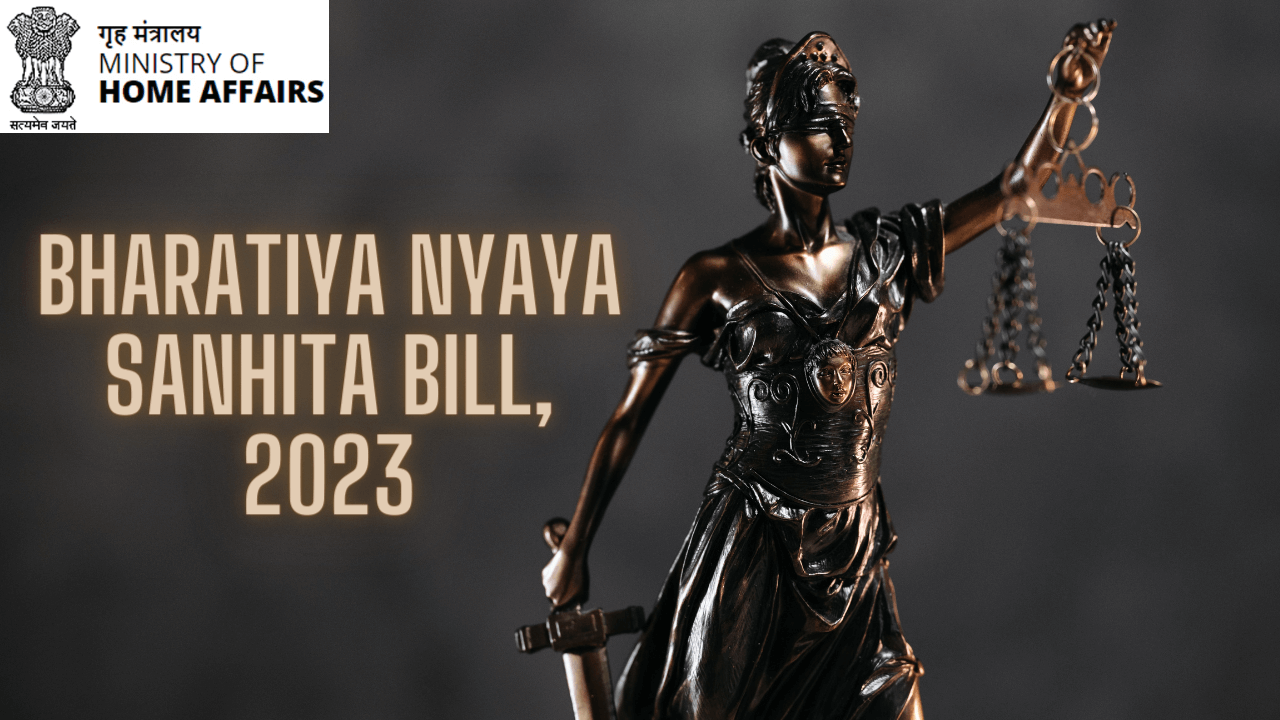Bharatiya Nyaya Sanhita Bill 2023
Union Home Minister and Minister of Cooperation, Shri Amit Shah, introduced three new Bills in the Lok Sabha that propose a comprehensive revamp of the country’s criminal justice system.
These three Bills are intended to replace the existing laws: the Indian Penal Code (IPC), 1860; the Code of Criminal Procedure (CrPC), 1973; and the Indian Evidence Act, 1872.
- The IPC will be replaced by the Bharatiya Nyaya Sanhita Bill, 2023.
- The CrPC will be replaced by the Bharatiya Nagarik Suraksha Sanhita Bill, 2023.
- The Indian Evidence Act will be replaced by the Bharatiya Sakshya Bill, 2023.
Criminal Law Reforms Committee
The Ministry of Home Affairs initiated a significant step towards criminal law reform by forming a committee, as indicated in a notification dated May 4, 2020. The committee was entrusted with the crucial task of reviewing the three codes of criminal law in the country.
Chairman
Chaired by Prof. (Dr.) Ranbir Singh, an esteemed former Vice Chancellor of the National Law University (NLU) in Delhi, the committee brought together legal expertise to undertake this substantial undertaking.
Mandate
The committee’s primary mandate was to propose comprehensive reforms to the nation’s criminal laws, guided by principles of effectiveness and efficiency. The aim was to modernize and strengthen these laws to better serve the evolving needs of society.
In February, the committee submitted its report.
About the Indian Penal Code (IPC)
The Indian Penal Code (IPC) is a comprehensive code that defines criminal offences in India. It was enacted in 1860 by the British colonial government and is still in force today.
- The Indian Penal Code was created by the first Law Commission, led by Thomas Babington Macaulay, in 1834. This set of laws became effective in January 1860.
- The IPC is divided into 23 chapters and 511 sections. The chapters cover a wide range of offences, including murder, theft, robbery, dacoity, forgery, cheating, and many more.
- The sections of the IPC define the offences in detail and prescribe the punishments that can be imposed for them. The punishments range from death sentences to fines and imprisonment.
The IPC is a very important piece of legislation in India. It is the basis for the criminal justice system in the country. The IPC is also used in other Commonwealth countries, such as Pakistan, Bangladesh, and Sri Lanka.
About the Bhartiya Nyaya Sanhita Bill 2023
There’s a new proposal called the Bharatiya Nyaya Sanhita Bill, 2023, which aims to replace the current IPC. This new bill suggests various updates to the current rules, such as those concerning defamation, crimes against women, and attempts to harm oneself.
Interestingly, the IPC has 511 parts, but the BNS Bill has 356 sections.
Key Highlights of the Bharatiya Nyaya Sanhita Bill 2023
- Sedition:
- The current IPC section 124-A deals with sedition and prescribes penalties ranging from life imprisonment to up to three years, along with a possible fine.
- In the Bharatiya Nyaya Sanhita Bill, section 150 under the ‘ Offences against the State’ chapter addresses acts that endanger India’s sovereignty, unity, and integrity.
- Terrorism:
- The Bharatiya Nyaya Sanhita Bill introduces a clear definition of terrorism, which was absent in the IPC.
- A terrorist is defined as someone who commits acts in India or abroad with the intent to threaten India’s unity, integrity, and security, intimidate the public, or disrupt public order.
- Defamation:
- In the Bharatiya Nyaya Sanhita Bill, defamation can lead to imprisonment for up to two years, a fine, community service, or a combination of these.
- Mob Lynching:
- The Bharatiya Nyaya Sanhita Bill introduces the possibility of capital punishment for mob lynching, along with a prison term of 7 years or life imprisonment.
- Sexual Exploitation:
- The new Bill considers the sexual exploitation of women on the pretext of marriage, job, promotions, or false identity as a crime.
- Adultery:
- The new Bill eliminates the provision for adultery, aligning with a 2018 Supreme Court ruling that declared Section 497 of the IPC unconstitutional.
- Marital Rape:
- The provision legalizing marital rape remains in the new Bill.
- Unnatural Sexual Offences:
- The new Bill doesn’t penalize ‘unnatural sexual offences against men,’ following a 2018 Supreme Court ruling that decriminalized consensual same-sex relations.
- Murder:
- The Bharatiya Nyaya Sanhita Bill covers murder penalties under section 101 while retaining the life term or death sentence as punishment.
- Speedy Legal Procedure:
- The proposed Bill mandates filing a charge sheet within 90 days, with an additional 90-day extension upon court permission.
The investigation must conclude in 180 days, followed by trial and judgment within 30 days.
- The proposed Bill mandates filing a charge sheet within 90 days, with an additional 90-day extension upon court permission.
- Weekly Current Affairs 2025 PDF For Bank, SSC, UPSC Exams
- Unsung Heroes of India: 10 Unknown Freedom Fighters You Should Know
- 26 December Current Affairs 2023 in English
- Daily Current Affairs 2025, Check Today’s Current Affairs
- April Month Current Affairs 2024, Download PDF
- June Month Current Affairs 2024, Download PDF

Hello, I’m Aditi, the creative mind behind the words at Oliveboard. As a content writer specializing in state-level exams, my mission is to unravel the complexities of exam information, ensuring aspiring candidates find clarity and confidence. Having walked the path of an aspirant myself, I bring a unique perspective to my work, crafting accessible content on Exam Notifications, Admit Cards, and Results.
At Oliveboard, I play a crucial role in empowering candidates throughout their exam journey. My dedication lies in making the seemingly daunting process not only understandable but also rewarding. Join me as I break down barriers in exam preparation, providing timely insights and valuable resources. Let’s navigate the path to success together, one well-informed step at a time.






